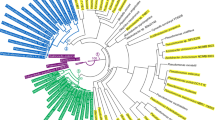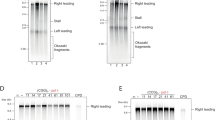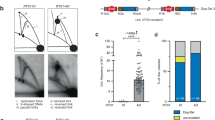Abstract
Chromosome duplication normally initiates through the assembly of replication fork complexes at defined origins1,2. DNA synthesis by any one fork is thought to cease when it meets another travelling in the opposite direction, at which stage the replication machinery may simply dissociate before the nascent strands are finally ligated. But what actually happens is not clear. Here we present evidence consistent with the idea that every fork collision has the potential to threaten genomic integrity. In Escherichia coli this threat is kept at bay by RecG DNA translocase3 and by single-strand DNA exonucleases. Without RecG, replication initiates where forks meet through a replisome assembly mechanism normally associated with fork repair, replication restart and recombination4,5, establishing new forks with the potential to sustain cell growth and division without an active origin. This potential is realized when roadblocks to fork progression are reduced or eliminated. It relies on the chromosome being circular, reinforcing the idea that replication initiation is triggered repeatedly by fork collision. The results reported raise the question of whether replication fork collisions have pathogenic potential for organisms that exploit several origins to replicate each chromosome.
This is a preview of subscription content, access via your institution
Access options
Subscribe to this journal
Receive 51 print issues and online access
$199.00 per year
only $3.90 per issue
Buy this article
- Purchase on Springer Link
- Instant access to full article PDF
Prices may be subject to local taxes which are calculated during checkout




Similar content being viewed by others
References
Reyes-Lamothe, R., Wang, X. & Sherratt, D. Escherichia coli and its chromosome. Trends Microbiol. 16, 238–245 (2008)
Diffley, J. F. Quality control in the initiation of eukaryotic DNA replication. Phil. Trans. R. Soc. B 366, 3545–3553 (2011)
Rudolph, C. J., Upton, A. L., Briggs, G. S. & Lloyd, R. G. Is RecG a general guardian of the bacterial genome? DNA Repair 9, 210–223 (2010)
Gabbai, C. B. & Marians, K. J. Recruitment to stalled replication forks of the PriA DNA helicase and replisome-loading activities is essential for survival. DNA Repair 9, 202–209 (2010)
Kowalczykowski, S. C. Initiation of genetic recombination and recombination-dependent replication. Trends Biochem. Sci. 25, 156–165 (2000)
Kim, N. & Jinks-Robertson, S. Transcription as a source of genome instability. Nature Rev. Genet. 13, 204–214 (2012)
Paul, S., Million-Weaver, S., Chattopadhyay, S., Sokurenko, E. & Merrikh, H. Accelerated gene evolution through replication-transcription conflicts. Nature 495, 512–515 (2013)
Rudolph, C. J., Dhillon, P., Moore, T. & Lloyd, R. G. Avoiding and resolving conflicts between DNA replication and transcription. DNA Repair 6, 981–993 (2007)
Mott, M. L. & Berger, J. M. DNA replication initiation: mechanisms and regulation in bacteria. Nature Rev. Microbiol. 5, 343–354 (2007)
Kogoma, T. Stable DNA replication: Interplay between DNA replication, homologous recombination, and transcription. Microbiol. Mol. Biol. Rev. 61, 212–238 (1997)
Skovgaard, O., Bak, M., Lobner-Olesen, A. & Tommerup, N. Genome-wide detection of chromosomal rearrangements, indels, and mutations in circular chromosomes by short read sequencing. Genome Res. 21, 1388–1393 (2011)
Trautinger, B. W., Jaktaji, R. P., Rusakova, E. & Lloyd, R. G. RNA polymerase modulators and DNA repair activities resolve conflicts between DNA replication and transcription. Mol. Cell 19, 247–258 (2005)
Dutta, D., Shatalin, K., Epshtein, V., Gottesman, M. E. & Nudler, E. Linking RNA polymerase backtracking to genome instability in E. coli. Cell 146, 533–543 (2011)
Gregg, A. V., McGlynn, P., Jaktaji, R. P. & Lloyd, R. G. Direct rescue of stalled DNA replication forks via the combined action of PriA and RecG helicase activities. Mol. Cell 9, 241–251 (2002)
Rudolph, C. J., Mahdi, A. A., Upton, A. L. & Lloyd, R. G. RecG protein and single-strand DNA exonucleases avoid cell lethality associated with PriA helicase activity in Escherichia coli. Genetics 186, 473–492 (2010)
Cui, T. et al. Escherichia coli with a linear genome. EMBO Rep. 8, 181–187 (2007)
Wang, X., Lesterlin, C., Reyes-Lamothe, R., Ball, G. & Sherratt, D. J. Replication and segregation of an Escherichia coli chromosome with two replication origins. Proc. Natl Acad. Sci. USA 108, E243–E250 (2011)
Mahdi, A. A., Briggs, G. S. & Lloyd, R. G. Modulation of DNA damage tolerance in Escherichia coli recG and ruv strains by mutations affecting PriB, the ribosome and RNA polymerase. Mol. Microbiol. 86, 675–691 (2012)
Fachinetti, D. et al. Replication termination at eukaryotic chromosomes is mediated by Top2 and occurs at genomic loci containing pausing elements. Mol. Cell 39, 595–605 (2010)
Steinacher, R., Osman, F., Dalgaard, J. Z., Lorenz, A. & Whitby, M. C. The DNA helicase Pfh1 promotes fork merging at replication termination sites to ensure genome stability. Genes Dev. 26, 594–602 (2012)
Ralf, C., Hickson, I. D. & Wu, L. The Bloom’s syndrome helicase can promote the regression of a model replication fork. J. Biol. Chem. 281, 22839–22846 (2006)
Whitby, M. C. The FANCM family of DNA helicases/translocases. DNA Repair 9, 224–236 (2010)
Betous, R. et al. SMARCAL1 catalyzes fork regression and Holliday junction migration to maintain genome stability during DNA replication. Genes Dev. 26, 151–162 (2012)
Killen, M. W., Stults, D. M., Wilson, W. A. & Pierce, A. J. Escherichia coli RecG functionally suppresses human Bloom syndrome phenotypes. BMC Mol. Biol. 13, 33 (2012)
Kornblum, C. et al. Loss-of-function mutations in MGME1 impair mtDNA replication and cause multisystemic mitochondrial disease. Nature Genet. 45, 214–219 (2013)
Müller, C. A. & Nieduszynski, C. A. Conservation of replication timing reveals global and local regulation of replication origin activity. Genome Res. 22, 1953–1962 (2012)
Datsenko, K. A. & Wanner, B. L. One-step inactivation of chromosomal genes in Escherichia coli K-12 using PCR products. Proc. Natl Acad. Sci. USA 97, 6640–6645 (2000)
McGlynn, P. & Lloyd, R. G. Modulation of RNA polymerase by (p)ppGpp reveals a RecG-dependent mechanism for replication fork progression. Cell 101, 35–45 (2000)
Miller, J. H. Experiments in Molecular Genetics (Cold Spring Harbor Laboratory, 1972)
Rudolph, C. J., Upton, A. L. & Lloyd, R. G. Replication fork collisions cause pathological chromosomal amplification in cells lacking RecG DNA translocase. Mol. Microbiol. 74, 940–955 (2009)
Rybchin, V. N. & Svarchevsky, A. N. The plasmid prophage N15: a linear DNA with covalently closed ends. Mol. Microbiol. 33, 895–903 (1999)
Acknowledgements
We thank T. Horiuchi and D. Sherratt for E. coli strains, A. Mahdi for help with DNA extractions, S. Malla and M. Blythe for deep sequencing, S. Demolli and D. Ivanova for control experiments, and C. Buckman and L. Harris for assistance. This work was supported by grants from the MRC (R.G.L., G0800970), the Leverhulme Trust (C.J.R.) and the BBSRC (C.A.N., BB/E023754/1).
Author information
Authors and Affiliations
Contributions
C.J.R. and R.G.L. initiated and directed the project. C.J.R., A.L.U., A.S., C.A.N. and R.G.L. performed the experimental work. C.J.R., A.L.U., C.A.N. and R.G.L. analysed the data and wrote the paper.
Corresponding author
Ethics declarations
Competing interests
The authors declare no competing financial interests.
Supplementary information
Supplementary Information
This file contains Supplementary Table 1, Supplementary Figures 1-8, a Supplementary Discussion and Supplementary References. (PDF 4884 kb)
Rights and permissions
About this article
Cite this article
Rudolph, C., Upton, A., Stockum, A. et al. Avoiding chromosome pathology when replication forks collide. Nature 500, 608–611 (2013). https://doi.org/10.1038/nature12312
Received:
Accepted:
Published:
Issue Date:
DOI: https://doi.org/10.1038/nature12312
This article is cited by
-
Gene duplication and deletion caused by over-replication at a fork barrier
Nature Communications (2023)
-
Replication fork binding triggers structural changes in the PriA helicase that govern DNA replication restart in E. coli
Nature Communications (2023)
-
The in vivo measurement of replication fork velocity and pausing by lag-time analysis
Nature Communications (2023)
-
Escherichia coli cell factories with altered chromosomal replication scenarios exhibit accelerated growth and rapid biomass production
Microbial Cell Factories (2022)
-
DNA copy-number measurement of genome replication dynamics by high-throughput sequencing: the sort-seq, sync-seq and MFA-seq family
Nature Protocols (2020)
Comments
By submitting a comment you agree to abide by our Terms and Community Guidelines. If you find something abusive or that does not comply with our terms or guidelines please flag it as inappropriate.



